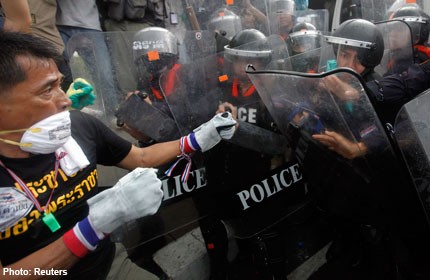Thai Finance Ministry occupied amid huge anti-government protests

BANGKOK - Anti-government protesters forced their way into Thailand's Finance Ministry on Monday, laying out sleeping mats in its rooms and hallways in an escalating bid to overthrow Prime Minister Yingluck Shinawatra.
They also broke into the compound of the Foreign Ministry, a Reuters witness said.
The seizing of government buildings by protesters led by the opposition Democrat Party thrusts Thailand into a new chapter of political volatility three years after it was convulsed by its bloodiest political unrest in a generation.
The protesters say Yingluck is a puppet of her brother, former Prime Minister Thaksin Shinawatra, who was ousted in a 2006 military coup and convicted two years later of graft - charges that he denies. Thaksin lives in self-imposed exile but exerts enormous influence over his sister's government.
About 1,000 protesters swarmed into the Finance Ministry's compound, filling up the first floor of the main building and occupying six others. Many gathered in hallways and meeting rooms, blowing whistles and spreading out large plastic mats for sleeping and eating.
Staff left the building and moved to a parking lot.
"I invite protesters to stay here overnight at the Finance Ministry," protest leader Suthep Thaugsuban told a crowd in front of the ministry.
"Our only objective is to rid the country of the Thaksin regime," said Suthep, a former deputy prime minister under the previous Democrat-led government.
"The Finance Ministry was taken over by the people to prevent the government from transferring money as a tool for Thaksin's regime."
The protests have brought back memories of a tumultuous 2008 when anti-Thaksin "yellow shirt" protesters shut down Bangkok's airports and held crippling rallies against a Thaksin-backed government, which was eventually disbanded by a court.
LOW SECURITY
There were almost no police at the Finance Ministry, witnesses said.
"The government cannot use force at this juncture. If they do, they will lose immediately," said Boonyakiat Karavekphan, a political analyst at Ramkamhaeng University in Bangkok.
"The government's only option now is to let the occupations happen and to refrain from touching the protesters."
Yingluck's broad support in Thailand's vote-rich north and northeast - rural regions that are among the country's poorest - helped her win a 2011 election by a landslide.
That vote was seen as a victory for the poor and a defeat for the Bangkok elite who support the Democrats - from top generals to royal advisers, middle-class bureaucrats and business leaders - and mistrust Thaksin and his sister.
After a delicate calm for the past two years, long-simmering tension between those factions is flaring again into the open.
Suthep declared the Finance Ministry would be a "second stage" in a protest that began on Oct. 31 and had been mostly confined to Bangkok's historic quarter, where about 100,000 people gathered on Sunday.
That was the largest demonstration since April-May 2010, when Thaksin's mostly rural "red shirt" supporters tried to bring down a Democrat-led government. Those protests were eventually quelled by a military crackdown in which 91 people, most of them Thaksin supporters, were killed.
[[nid:62336]]
"GET OUT"
On Monday, the protesters began the day chanting "Get Out!" against the government as they fanned out to state offices, military and naval bases and state television channels. A German photojournalist was attacked after a speaker at one protest site identified him as a pro-government sympathiser.
Nick Nostitz said he was punched several times before escaping behind nearby police lines.
The Finance Ministry's power was cut briefly after the protesters burst inside, a Reuters witness said.
The mounting tension condemned the baht currency to an 11-week low, down 0.4 per cent to 31.97 to the dollar. Thailand's benchmark stock index lost 0.5 per cent to its lowest since Sept. 6, taking its year-to-date loss to 2.8 per cent, Asia's third worst performer.
"The sentiment of the Thai stock market remains fragile,"Phillip Securities market strategist Teerada Charnyingyong said.
Anti-government rallies, which began last month, were triggered by a government-backed amnesty bill that could have led to the return of Thaksin, without facing jail time for a 2008 corruption sentence.
Although the bill has been dropped, the demonstrations have grown into an all-out call for government change and the ouster of Yingluck who is widely viewed as Thaksin's proxy.
Yingluck, who faces a no-confidence debate on Tuesday, said she would not leave office. "I have no intention to resign or dissolve the House," she told reporters.
She cautioned that the protests could hurt tourism and investor confidence.
Suthep exhorted the crowd to also seize the government's Public Relations Department, a few blocks from the Finance Ministry. By afternoon, about 500 protesters were inside the grounds but not inside the building, which is controlled by the office of the Prime Minister.
Thaksin, who won elections in 2001 and 2005 by landslides, remains a populist hero among the poor. But corruption scandals steadily eroded his popularity among Bangkok's middle class.
Yingluck's ruling Puea Thai Party received a blow last week when the Constitutional Court rejected its proposals to make the Senate fully elected. That could have strengthened her government given her widespread support among voters in the heavily populated north and northeast.
Supporters of Thaksin and Yingluck gathered in a stadium at the opposite end of the city, about 15 km (9 miles) away, say the court verdict is the latest attempt by anti-Thaksin forces to thwart the legislative process.
[[nid:62336]]